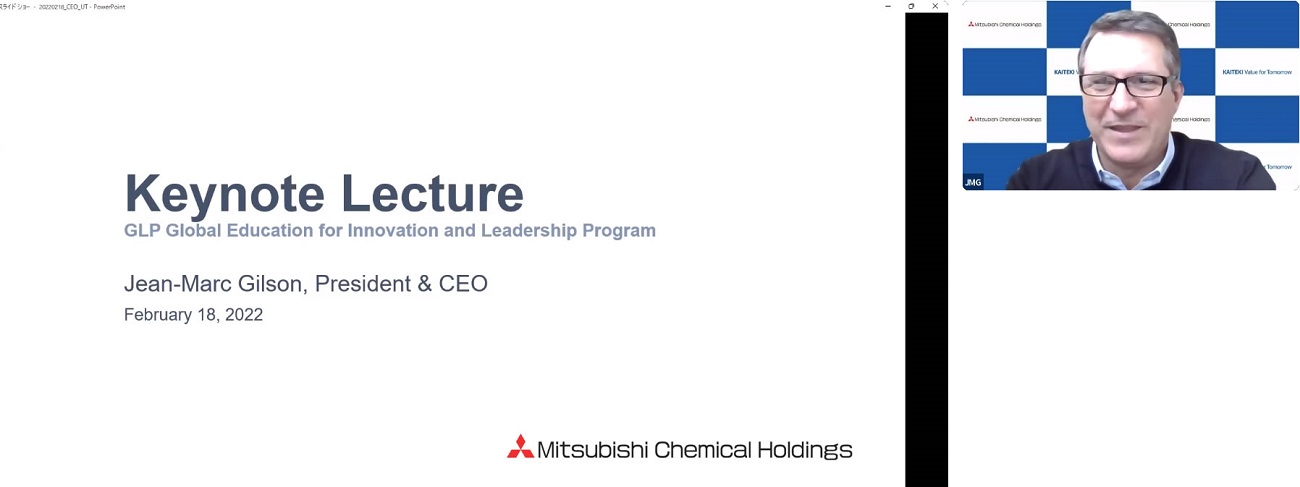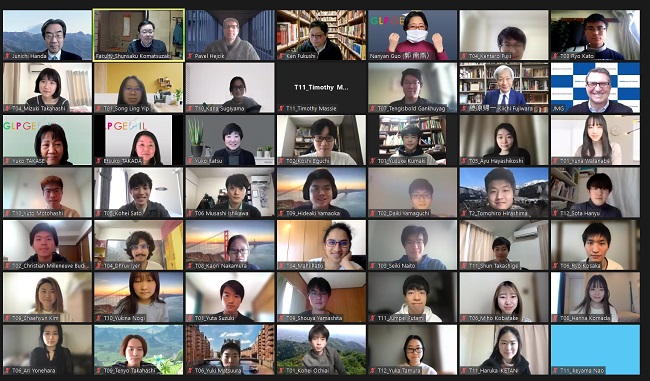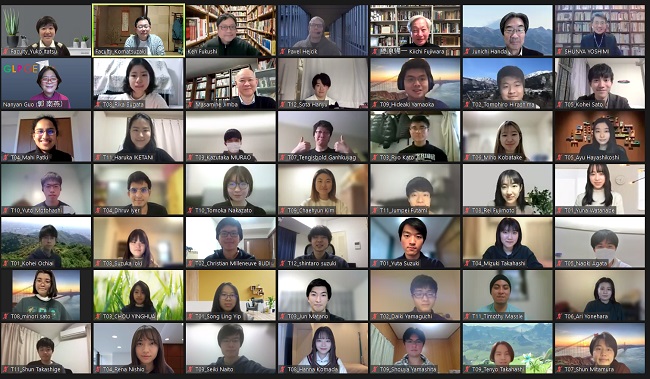Global Leader Lecture Series
About Global Leader Lecture Series
Global Leader Lecture Series
The 'Global Leader Lectures' is a credit-bearing, compulsory GEfIL course for studnets participating in the Independent research Project PHASE2.past Global Leader lecture Series(Apr-May 2018 for GEfIL dai 2 kisei)
past Global Leader lecture Series(Mar 2019 for GEfIL dai 3 kisei)
past Global Leader lecture Series(Mar 2020 for GEfIL dai 4 kisei)
past Global Leader lecture Series(Mar 2021 for GEfIL dai 5 kisei)
2021 GEfIL Global Leader Lecture and Workshop 2022.02.18 (Fri) - 2022.02.20 (Sun)
The Global Leader Lecture and Workshop for GEfIL dai 6 kisei was conducted as an intensive online program over three days. While this event normally takes place at the UTokyo Yamanaka Lodge, this was the third year it was held online again to prevent the spread of COVID-19.
The theme of the workshop this year was “Building resilient societies for well-being and happiness.” For our keynote speakers, we welcomed Dr. Julia Kim, Program Director of the Gross National Happiness Center at Bhutan, and Mr. Jean-Marc Gilson, CEO of Mitsubishi Chemical Holdings, Inc. Dr. Kim offered a critical analysis of the limitations of the Gross Domestic Product (GDP) index and the consequences of this index used synonymously with development of all kinds including social progressiveness. Using the Gross National Happiness index, she illustrated her work in introducing a new index and paradigm on how to think about economic gain and societal well-being. Mr. Gilson discussed the trajectory of his career as a Belgium-born engineer to running chemical companies and investment funds in the U.S. and France before taking on the role of CEO in Japan. He offered practical advice on decision making and analyses on Japanese corporate culture. The students took full advantage of the discussion time with the keynote speakers with a wide range of questions.
Later on the first day, the students deepened their understanding of design thinking. Ms. Hiromi Hara, COO and Innovation Office Director from SAP Japan, offered valuable instruction on a variety of methods designed specifically to suit the team projects. Students enhanced their understanding of human-centered innovation by practicing using methods on persona creation, pre-mortem, and foreseeing obstacles to achieve the ideal outcome.
The steering committee included twelve students who designed themes for the group projects and facilitated the discussions. Group projects included the following urgent issues; more equitable global distribution of the COVID-19 vaccine, guaranteeing supply chain operations after a disaster, mental health support of young people, and nurturing volunteering for disaster-preparedness. On the final day, the students presented their ideas which were followed by a lively discussion and advice from the faculty mentors.
The theme of the workshop this year was “Building resilient societies for well-being and happiness.” For our keynote speakers, we welcomed Dr. Julia Kim, Program Director of the Gross National Happiness Center at Bhutan, and Mr. Jean-Marc Gilson, CEO of Mitsubishi Chemical Holdings, Inc. Dr. Kim offered a critical analysis of the limitations of the Gross Domestic Product (GDP) index and the consequences of this index used synonymously with development of all kinds including social progressiveness. Using the Gross National Happiness index, she illustrated her work in introducing a new index and paradigm on how to think about economic gain and societal well-being. Mr. Gilson discussed the trajectory of his career as a Belgium-born engineer to running chemical companies and investment funds in the U.S. and France before taking on the role of CEO in Japan. He offered practical advice on decision making and analyses on Japanese corporate culture. The students took full advantage of the discussion time with the keynote speakers with a wide range of questions.
Later on the first day, the students deepened their understanding of design thinking. Ms. Hiromi Hara, COO and Innovation Office Director from SAP Japan, offered valuable instruction on a variety of methods designed specifically to suit the team projects. Students enhanced their understanding of human-centered innovation by practicing using methods on persona creation, pre-mortem, and foreseeing obstacles to achieve the ideal outcome.
The steering committee included twelve students who designed themes for the group projects and facilitated the discussions. Group projects included the following urgent issues; more equitable global distribution of the COVID-19 vaccine, guaranteeing supply chain operations after a disaster, mental health support of young people, and nurturing volunteering for disaster-preparedness. On the final day, the students presented their ideas which were followed by a lively discussion and advice from the faculty mentors.





